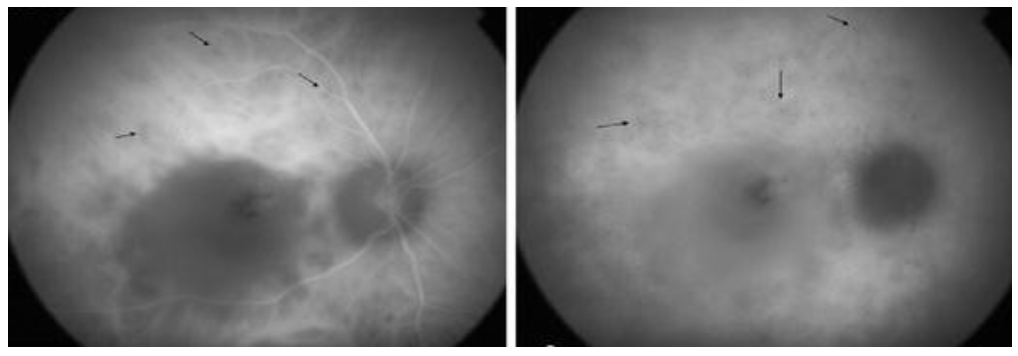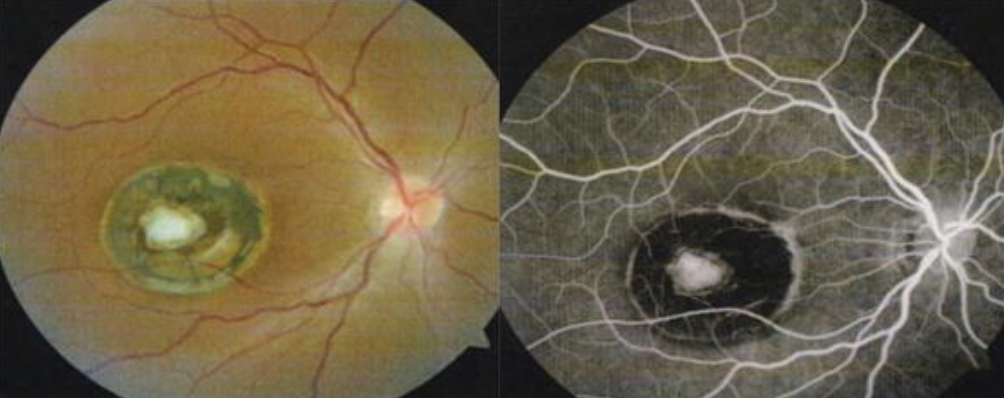Toxoplasmosis is an infection caused by the intracellular protozoan parasite known as Toxoplasma gondii. The infection may be acquired or congenital, whereby the foetus acquires it from the mother while in the womb. Most people contract toxoplasmosis by eating raw or undercooked meat, vegetables or dairy products, or by coming into contact with infected cats, contaminated sandboxes or cat litter boxes – all of which have been contaminated with cat faeces. Although most parasite-infected individuals do not exhibit any symptoms, some people may experience flu-like symptoms, such as fever, headache and muscle aches. Infants and those with low immune systems are most frequently affected by serious forms of this disease. Toxoplasmosis during pregnancy may cause miscarriage and birth abnormalities.
Ocular toxoplasmosis occurs in the eye, where Toxoplasma gondii can cause inflammation. Frequently, ocular toxoplasmosis results from the reactivation of a congenital infection, although an acquired infection is now regarded to be more common. The parasite typically affects the retina causing eye pain, blurred vision and possibly permanent damage, including blindness.

What investigations are involved?
Ocular toxoplasmosis can look like other eye diseases that cause inflammation in the back of the eye (posterior and panuveitis). The doctor will look at the signs and symptoms to aid in coming to a diagnosis, which is based on clinical findings. If it’s not clear, a test called polymerase chain reaction (PCR) can be done to look for Toxoplasma DNA in the fluid from the eye and blood samples.
There are two imaging tests called Fundus Fluorescein Angiography (FFA) and Indocyanine Green (ICG) that can be used to visualize blood flow in the eye, which may help diagnose ocular toxoplasmosis.
Management / Treatment
Ocular toxoplasmosis requires personalized care, meaning that treatment will vary from person to person depending on factors such as the location of the infection, the severity of inflammation, and the patient’s immune system. If someone with a healthy immune system gets an ocular infection, it will usually go away on its own. However, if the infection affects certain parts of the eye, treatment may be necessary. People with weakened immune systems, such as those who have had transplants or are HIV-positive, may need long-term treatment.
There are several drugs available to treat ocular toxoplasmosis, and doctors often use a combination of drugs to help patients recover quickly and with minimal damage to their eyes. These drugs can kill the parasite responsible for the infection, but they work best when used together. In some cases, surgery may be necessary to treat complications like retinal detachment, cataract and choroidal or epiretinal neovascular membranes involving the macula.
It’s common for ocular toxoplasmosis to recur after someone has had it before, but relapses are not contagious and do not pose a risk to others. Relapses don’t pose a threat to an unborn child if the mother is pregnant.
Prevention
Preventive measures include thoroughly cleaning and washing fruits and vegetables, cooking meat adequately to destroy any harbored cysts, and avoiding contact with cat litter pans during pregnancy. Women of childbearing age must take adequate contraceptive measures for six months following primary toxoplasmosis infection.
In conclusion, preventing toxoplasmosis is crucial for maintaining healthy eyes, and early diagnosis and treatment are essential for managing the infection. At OasisEye Specialists, we offer comprehensive eye care services, including diagnosis and treatment of uveitis caused by toxoplasmosis. Our experienced team of eye specialists is committed to providing personalized care and innovative treatments to preserve and improve our patients’ vision. Contact us today to schedule a consultation and take the first step towards optimal eye health.
Residents within Klang Valley in areas such as Cheras, Puchong, Shah Alam, Petaling Jaya, and Kepong can visit our low vision specialist, Ms Vinodhini Naidu to have their eyes examined at Nexus Bangsar South KL branch. Residents in Seremban 2, Senawang, Sendayan and Port Dickson can visit Dr Teh Wee Min at our Seremban branch. Residents in Johor Bahru, Skudai, Kulai, Iskandar Puteri, Senai, Tebrau, Batu Pahat, Kluang, Segamat can visit Dr Ling Kiet Phang or Dr Chan Choon Teng at our Johor Bahru branch. Residents in Perai, Bukit Mertajam, Butterworth, Penang island, Alor Setar, Kulim and Sungai Petani can visit Dato’ Dr Haslina at our Penang branch.


